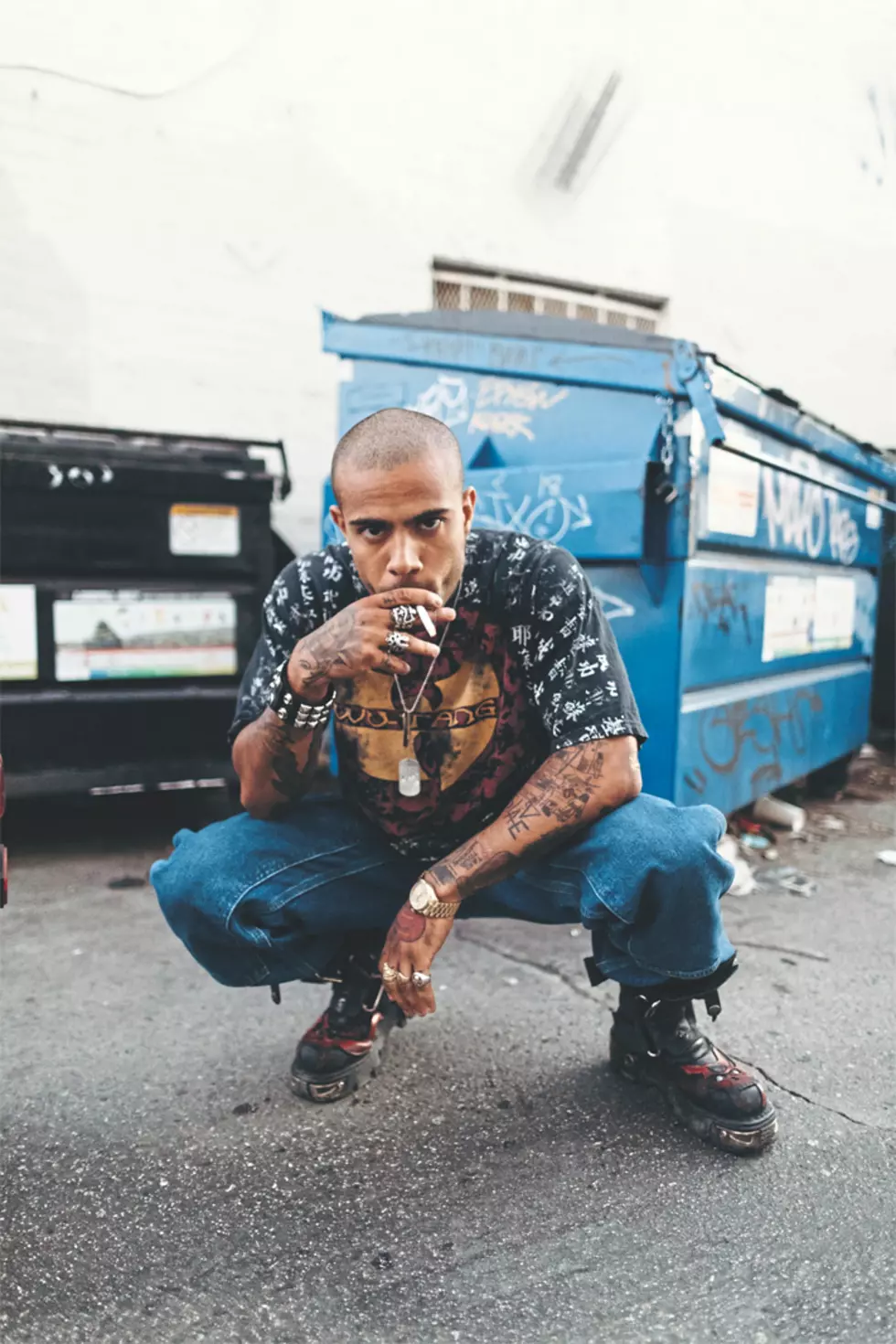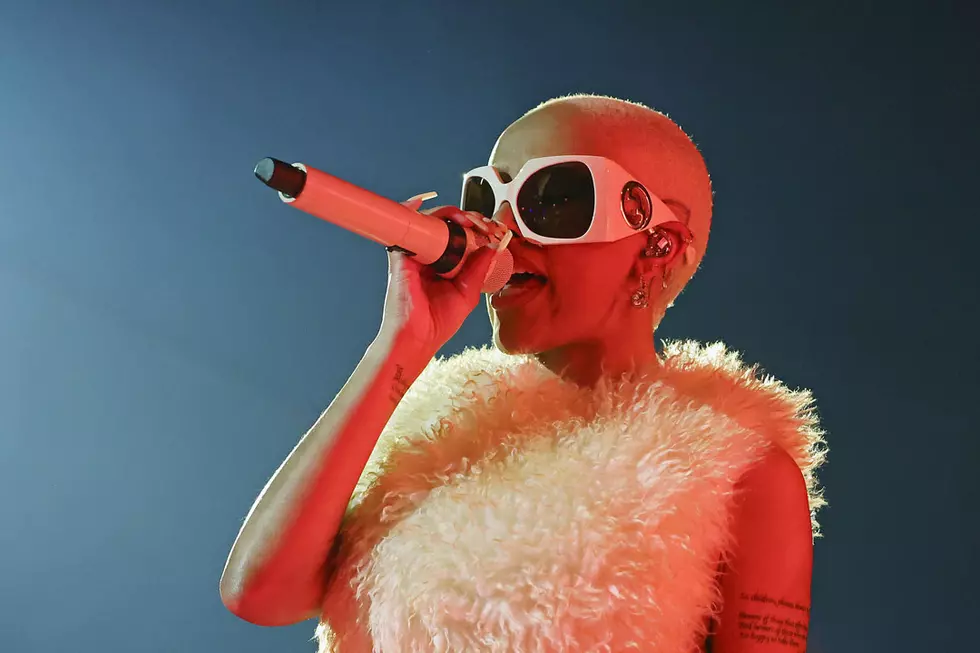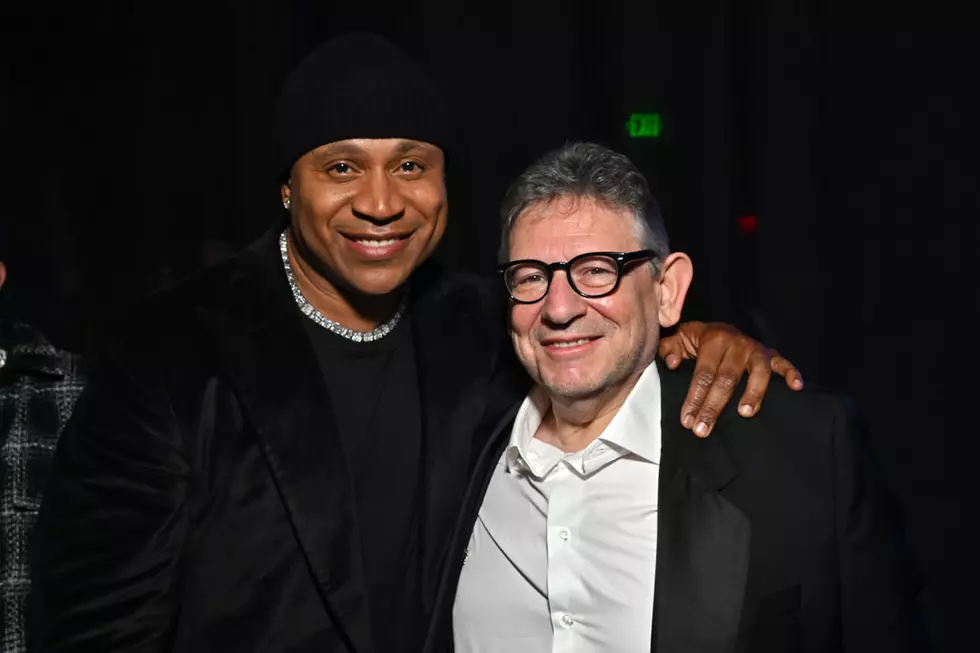
Vic Mensa Evolves From Rapper to Activist and Women’s Equality Proponent
Stand Up Guy
Conquering the real-life nightmares that Vic Mensa has endured transformed the Chicago artist into something greater: an activist, philanthropist and women's equality proponent. Now he wants to be a change agent for hip-hop.
Words: Kathy Iandoli
Editor’s Note: This story originally appeared in the Winter 2018 issue of XXL Magazine, on stands now.
On a summer day in July 2016, Vic Mensa parks his BMW aside a fire hydrant in front of his childhood home in the Southside of Chicago. He hops out and walks to the porch, pointing at a gas station in the distance—it’s where he witnessed his first robbery. “I saw a man get robbed at gunpoint right in that parking lot,” Vic says. He jumps off the porch and does a military duck walk back toward the fire hydrant. “I watched from right here.” His attention diverts. He gets back into his car and heads to Grant Park for a cameo performance with SaveMoney affiliate Towkio at Lollapalooza. Vic parks illegally on a side street in Chicago’s downtown district, enters the park, plows through the festival grounds via golf cart in the rain and takes the stage just in time to lend a verse. Yet, even in that exhilarating moment, he’s reminded of another past trauma.
After Vic’s appearance onstage, he walks to the same infrastructure that nearly killed him back in 2010. Then just a teen flirting with music industry dreams, the rapper was attempting to climb a fence to sneak into Lollapalooza when he was electrocuted after inadvertently touching an electric transformer. Reflecting on that brush with death—in which he plummeted 30 feet onto train tracks—he extends his arms to show the scars from where the current entered his bones and pushed back out through his skin. In the Chi, it seems, Vic is never too far removed from the painful memories that have shaped him.
The artist, born Victor Kwesi Mensah, was in a transitional phase in his life back then. He’d recently inked a deal with his idol Jay-Z’s Roc Nation and was preparing his precisely titled debut album, The Autobiography, which would drop in July 2017. A series of failed romantic relationships led the then-22-year-old artist into a spiral of introspection, attempting to pinpoint how his life experiences had affected his ability to express love for himself and others. He was beginning to ponder how to translate his passion for societal change and desire for self-improvement into action.
Fast-forward two years, Vic is sipping a ginger ale in the lobby of Manhattan’s Public Hotel on a chilly afternoon in November 2018. His chin-length dreads have been replaced with a short fade, which is concealed by a Von Dutch cap. While The Autobiography wasn’t as commercially successful as he’d anticipated (it sold nearly 16,000 unit equivalents in its first week), the album secured Vic’s spot as one of hip-hop’s most thoughtful young artists—a brand he’s used to both continue his philanthropic work and speak out about society’s ills, reflected in hip-hop and beyond. Since that weekend in Chicago, he’s relocated to Los Angeles, checked himself into a 12-step program, formed a mental health meets environmental justice foundation called SaveMoneySaveLife and traveled everywhere from Standing Rock to Palestine, all in the name of changing the world (and his world) like he wanted to. Of course, he set aside time to don Balmain in Paris and open for Jay-Z during 2017’s 4:44 Tour, but it’s all about balance.
“I’ve hit plenty of peaks and valleys,” says Vic, now 25, sporting a leather jacket from his upcoming 93 Punx fashion line. “But [I’ve] also matured in many ways and come closer to being the man I see myself as—the man I want to be. Assata Shakur says, ‘Freedom is the right to grow, the right to be who you are, the right to be who you want to be.’ I think I’ve always been searching for free.”
He’s onto an untitled album for a line in his controversial 2018 BET Hip Hop Awards cypher that aired in October. The freestyle rhyme included the line, “Your favorite rapper’s a domestic abuser,” which outraged XXXTentacion’s peers and fans that perceived it as a shot at a star who remains polarizing after his death. Vic apologized via Instagram to XXX’s mother, Cleopatra Bernard, who was in attendance to accept her son’s Best New Hip Hop Artist Award at the show but he did not take back his words. Freedom has its price.
Vic Mensa sat down with XXL to speak about the work he’s doing on himself, the example he seeks to set for his hip-hop peers, his new music and why when it comes to his expression, honesty is the best policy.
XXL: You’re an artist who can be a part of high fashion yet you do your part to change the world. Artists often get lost and forget that the other half is struggling.
Vic Mensa: I’m very rooted in existence with the people. I might go and spend time in the fashion space or film space because these things interest me and I have something to offer. But at the end of the day, my nigga James Warren still fighting 31 years right now for a leg shot. So, it don’t matter where I’m at. I might be in Seoul, South Korea with Jay Park, we in the studio recording and I get the call like, “I got James on the phone right now.” So, here I am talking to my homie who’s down, trying to keep his spirits alive, trying to let him know we love him and we have his back and we’re going to put some money on his books. Wherever life takes me, my connection to where I’m from never goes away because it’s still mouths to feed and niggas to free.
Chicago, I feel, is a microcosm for the segregated, violent environment that is America. I try to not only speak about these things in music, but also try to address these things in real life tangibly with action. I could see how things that we’ve done musically have been able to influence the real world, and it’s when you find that sweet spot between the boots on the ground and sounds in the airwaves… you really are able to see a Jason Van Dyke conviction for the murder of LaQuan McDonald. I won’t take credit for that, but I know they heard me. Jason Van Dyke’s defense played the music video for “16 Shots” in the trial to try to argue that he should be moved out of the city because there were too many people with biased opinions conspiring or influencing public opinion against him. When I did that song and video, I did a march downtown. I collaborated with so many people from Chicago—so many Black people, young Black women organizations like BYP100 and Assata’s Daughters. Just being out there, I saw what a community mobilizing can accomplish in terms of freedom and how music and my words in my music can play a significant part in that.
You’ve also done a lot of work on yourself.
Something that I’ve come to really unpack and start to understand is that aggression, so much of that shit comes from a place of a question mark over your self-worth. The violence that has existed in my life—how violent I’ve been—it’s directly tied to how depressive and dark I’ve been. They say depression is just anger turned inward. Sometimes I turn it outwards, sometimes I turn it inward, but I know it’s about self-worth.
I had a moment, man, in this hotel, actually! I’ve done so much self-upheaval work this year and I had this moment when I broke down. I was going through this 12-step program, I was like, seven months celibate and shit, just feeling my emotions in a different type of way. I was more in tune with them because I’d been doing so much intentional self-reflection work, writing down, notebooks full of stuff. I felt my heart and my mind turn me in different directions because my mind is telling me: “You’re not worth it. You fuck everything up. You don’t deserve anything; you are worthless!” But I know that I have a heart underneath all the scars. So something deep inside me is telling me that I do deserve love. But my mind is always playing tricks on me, so I’m having this freakout in this hotel room, just balling uncontrollably. I gotta go meet [famed footwear designer] Giuseppe [Zanotti]. I’m still crying my heart out in the cab on the way over there. Just getting it together to go meet Giuseppe. And this is what’s happening?
One thing that separates you from so many other artists who use their platform to emote is that you take accountability for your demons whereas a lot of artists don’t.
Yeah, it’s easy to romanticize it. It’s dangerous, it’s beautiful and it’s sexy sometimes. I’ve been learning to have a balance and keep an eye on that because as you start to revel in darkness and addiction and these other things, when you fall in love with it too much, then we end up losing an immensely talented young guy with endless potential like a Lil Peep. He was like a young sex symbol in his own drug-addicted right. It’s like, man, I got too much to do to let myself fall victim to romanticizing my darkness. But as far as accountability, as men right now in the current moment and political climate and culture, it is time for us to be accountable—to be held accountable, to hold ourselves and each other accountable. Everybody knows that the way our society has been structured, it ain’t working out. Women ain’t really having that shit no more and we shouldn’t be having it anymore either!
We just fell into a blueprint. All we ever saw of powerful men is them having women falling from their fingertips. We look to the rappers, ballplayers, actors, kings in history, and we’ve seen largely one thing. And it’s detrimental to all of us. We have to be able to unpack all of this shit and unpack the reasons why we speak to or view women in these ways. Especially in hip-hop.
You’ve been pretty vocal about rappers’ treatment of women.
We have to know hip-hop is fucked up as it pertains to women. The majority of times a woman is referenced in hip-hop, she’s a bitch or a hoe. We all know that shit is fucked up. Whether or not it’s fun in the club, it’s got real-life consequences. I realize things about the way I’ve been raised, the way I’ve acted and how I can use the new information that I have to be a better man. I want to be one of those people that can be a catalyst in other niggas recognizing that shit. Whether or not it makes me a villain sometimes or whatever, I’m like, Man, we got a lot of reckoning to do but it’s not a lost cause! This doesn’t have to be how it is and there’s so much heinous violence going on against women in the world right now. And obviously, so much shit that’s been exposed recently. On the hip-hop side of things I’m like, “Hey y’all, time’s up.” We’ve all made mistakes but that doesn’t mean we need to continue to make them and glorify them.
There are many people in the younger generation who don’t want to be bothered with the truth and that’s where shit gets dicey.
I come from a Black Panther school of thought. I was having a conversation last night and they were like, The thing with the Black Panther Party was they wasn’t shitting on young niggas; they was scooping up young niggas and street niggas and putting them on to game. That’s what Tupac [Shakur] comes from! He was handed the game directly from Afeni Shakur and Mutulu and Assata Shakur. I feel like I’m supposed to give that game right back down as I acquire different information. There’s many ways to say things, and oftentimes I’ve been crude and brash in my delivery. It could’ve honestly been far more effective, but at the root of it, I’m just trying to pass the truth along to where it’s been denied and forgotten. In search for the truth, sometimes you go through a precarious territory.
What made you become so vocal about protecting women?
I was raised by a woman and I’m the middle child of two sisters who are young Black women. My mom is cool as fuck. I love the shit out of her. If I’m being really honest, the way I came to being a part of this discussion was because of writing my last album. I recognized that one of my main outlets from pain, depression, shame, guilt… I cut out the drugs but I continued with women being my drug. I was in a relationship with a woman who did so much for me. She fucking helped me stay on this Earth because when I was on them drugs. I was so bad. She was selfless enough to look past everything I was doing and be like, “Man, I gotta help you because no one deserves to be suicidal every moment of every day.” I was so low, and through all that, I just didn’t know another way other than cheating, lying and weaving these intricate webs of deception.
Not to mention, all I’ve ever seen or thought about is like, I’m a rapper. I’ve learned my life through rap music! Obviously literature and life experience play a part as well, but I’m thinking about what I wanted myself to be coming from all these idols of mine. They had hoes in different area codes! So, it took time before I even came to the place to realize how I was moving was wrong. After some time, I couldn’t bear the disparity between what I was doing in music and the world and fighting for truth and honesty everywhere. But in my personal life—really just with women—being very dishonest. I felt so conflicted. Like a phony.
I stopped involving with women for a long time and started seeing why I was doing [what] I was doing. I had to remember every woman I’ve ever slept with and why, when, what was going on. I sat down in a diner for 14 hours straight and did that shit. And each one of them, I did that for validation to myself. I realized that there needs to be honesty in the relationships I have. Un-learning takes time but if you don’t address the problem in the first place, you cannot process it and grow.
What are you looking forward to?
I have a punk album that I’ve been writing this year; it’s like, punk music and trap drums. I have a clothing line, 93 Punx, that’s going to launch with the album. It’s topical but ambiguous, addressing shit like immigration detention centers, the Pulse nightclub shooting and Catholic priest sex abuse, just coming at it in crazy, creative, conceptual ways. I’m fucking with Travis Barker for some executive production shit. I’m from the year 1993 and it’s all these vintage leathers with a life behind them, denim, military. Just a whole new flavor on that shit.
I feel really good right now. For a while I was just kind of trying to understand, yet really reveling in that darkness. Now I feel like I have a strong foundation and sense of purpose.
Check out more from XXL’s Winter 2018 issue including our Migos cover story interview and more.
See Photos of Migos for the XXL Magazine Winter 2018 Issue
More From XXL









